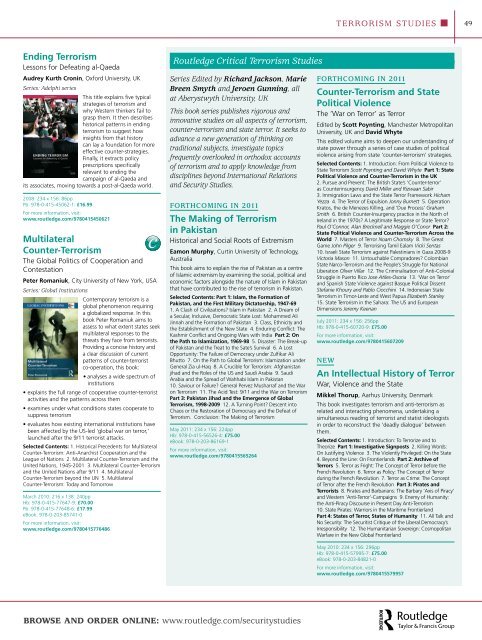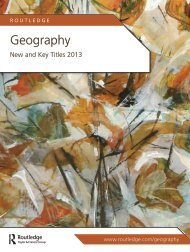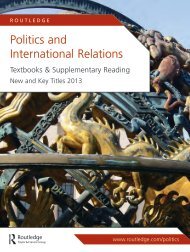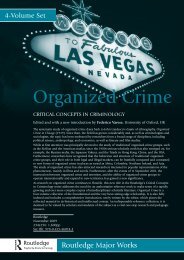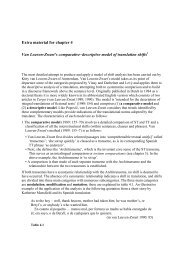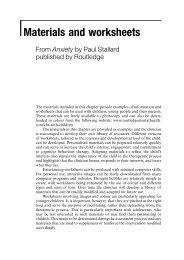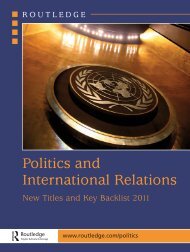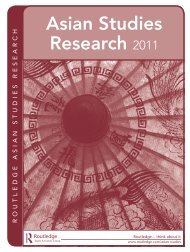Easily na - Routledge
Easily na - Routledge
Easily na - Routledge
Create successful ePaper yourself
Turn your PDF publications into a flip-book with our unique Google optimized e-Paper software.
Ending Terrorism<br />
Lessons for Defeating al-Qaeda<br />
Audrey Kurth Cronin, Oxford University, UK<br />
Series: Adelphi series<br />
This title explains five typical<br />
strategies of terrorism and<br />
why Western thinkers fail to<br />
grasp them. It then describes<br />
historical patterns in ending<br />
terrorism to suggest how<br />
insights from that history<br />
can lay a foundation for more<br />
effective counter-strategies.<br />
Fi<strong>na</strong>lly, it extracts policy<br />
prescriptions specifically<br />
relevant to ending the<br />
campaign of al-Qaeda and<br />
its associates, moving towards a post-al-Qaeda world.<br />
2008: 234 x 156: 86pp<br />
Pb: 978-0-415-45062-1: £16.99<br />
For more information, visit:<br />
www.routledge.com/9780415450621<br />
Multilateral<br />
Counter-Terrorism<br />
The Global Politics of Cooperation and<br />
Contestation<br />
Peter Romaniuk, City University of New York, USA<br />
Series: Global Institutions<br />
Contemporary terrorism is a<br />
global phenomenon requiring<br />
a globalized response. In this<br />
book Peter Romaniuk aims to<br />
assess to what extent states seek<br />
multilateral responses to the<br />
threats they face from terrorists.<br />
Providing a concise history and<br />
a clear discussion of current<br />
patterns of counter-terrorist<br />
co-operation, this book:<br />
• a<strong>na</strong>lyses a wide spectrum of<br />
institutions<br />
• explains the full range of cooperative counter-terrorist<br />
activities and the patterns across them<br />
• examines under what conditions states cooperate to<br />
suppress terrorism<br />
• evaluates how existing inter<strong>na</strong>tio<strong>na</strong>l institutions have<br />
been affected by the US-led ’global war on terror,’<br />
launched after the 9/11 terrorist attacks.<br />
Selected Contents: 1. Historical Precedents for Multilateral<br />
Counter-Terrorism: Anti-A<strong>na</strong>rchist Cooperation and the<br />
League of Nations 2. Multilateral Counter-Terrorism and the<br />
United Nations, 1945-2001 3. Multilateral Counter-Terrorism<br />
and the United Nations after 9/11 4. Multilateral<br />
Counter-Terrorism beyond the UN 5. Multilateral<br />
Counter-Terrorism: Today and Tomorrow<br />
March 2010: 216 x 138: 240pp<br />
Hb: 978-0-415-77647-9: £70.00<br />
Pb: 978-0-415-77648-6: £17.99<br />
eBook: 978-0-203-85741-0<br />
For more information, visit:<br />
www.routledge.com/9780415776486<br />
<strong>Routledge</strong> Critical Terrorism Studies<br />
Series Edited by Richard Jackson, Marie<br />
Breen Smyth and Jeroen Gunning, all<br />
at Aberystwyth University, UK<br />
This book series publishes rigorous and<br />
innovative studies on all aspects of terrorism,<br />
counter-terrorism and state terror. It seeks to<br />
advance a new generation of thinking on<br />
traditio<strong>na</strong>l subjects, investigate topics<br />
frequently overlooked in orthodox accounts<br />
of terrorism and to apply knowledge from<br />
disciplines beyond Inter<strong>na</strong>tio<strong>na</strong>l Relations<br />
and Security Studies.<br />
Forthcoming in 2011<br />
The Making of Terrorism<br />
in Pakistan<br />
Historical and Social Roots of Extremism<br />
Eamon Murphy, Curtin University of Technology,<br />
Australia<br />
This book aims to explain the rise of Pakistan as a centre<br />
of Islamic extremism by examining the social, political and<br />
economic factors alongside the <strong>na</strong>ture of Islam in Pakistan<br />
that have contributed to the rise of terrorism in Pakistan.<br />
Selected Contents: Part 1: Islam, the Formation of<br />
Pakistan, and the First Military Dictatorship, 1947-69<br />
1. A Clash of Civilizations? Islam in Pakistan 2. A Dream of<br />
a Secular, Inclusive, Democratic State Lost: Mohammed Ali<br />
Jin<strong>na</strong>h and the Formation of Pakistan 3. Class, Ethnicity and<br />
the Establishment of the New State 4. Enduring Conflict: The<br />
Kashmir Conflict and Ongoing Wars with India Part 2: On<br />
the Path to Islamization, 1969-98 5. Disaster: The Break-up<br />
of Pakistan and the Treat to the Sate’s Survival 6. A Lost<br />
Opportunity: The Failure of Democracy under Zulfikar Ali<br />
Bhutto 7. On the Path to Global Terrorism: Islamization under<br />
General Zia ul-Haq 8. A Crucible for Terrorism: Afghanistan<br />
jihad and the Roles of the US and Saudi Arabia 9. Saudi<br />
Arabia and the Spread of Wahhabi Islam in Pakistan<br />
10. Saviour or Failure? General Pervez Musharraf and the War<br />
on Terrorism 11. The Acid Test: 9/11 and the War on Terrorism<br />
Part 3: Pakistan Jihad and the Emergence of Global<br />
Terrorism, 1998-2009 12. A Turning Point? Descent into<br />
Chaos or the Restoration of Democracy and the Defeat of<br />
Terrorism. Conclusion: The Making of Terrorism<br />
May 2011: 234 x 156: 224pp<br />
Hb: 978-0-415-56526-4: £75.00<br />
eBook: 978-0-203-86169-1<br />
For more information, visit:<br />
www.routledge.com/9780415565264<br />
Browse and order online: www.routledge.com/securitystudies<br />
TerrorisM sTudies 49<br />
Forthcoming in 2011<br />
Counter-Terrorism and State<br />
Political Violence<br />
The ’War on Terror’ as Terror<br />
Edited by Scott Poynting, Manchester Metropolitan<br />
University, UK and David Whyte<br />
This edited volume aims to deepen our understanding of<br />
state power through a series of case studies of political<br />
violence arising from state ‘counter-terrorism’ strategies.<br />
Selected Contents: 1. Introduction: From Political Violence to<br />
State Terrorism Scott Poynting and David Whyte Part 1: State<br />
Political Violence and Counter-Terrorism in the UK<br />
2. Pursue and Prevent: The British State’s ‘Counter-terror’<br />
as Counterinsurgency David Miller and Rizwaan Sabir<br />
3. Immigration Laws and the State Terror Framework Hicham<br />
Yezza 4. The Terror of Expulsion Jonny Burnett 5. Operation<br />
Kratos, the de Menezes Killing, and ‘Due Process’ Graham<br />
Smith 6. British Counter-Insurgency practice in the North of<br />
Ireland in the 1970s? A Legitimate Response or State Terror?<br />
Paul O’Connor, Alan Brecknell and Maggie O’Conor Part 2:<br />
State Political Violence and Counter-Terrorism Across the<br />
World 7. Masters of Terror Noam Chomsky 8. The Great<br />
Game John Pilger 9. Terrorising Tamil Ealam Vicki Sentas<br />
10. Israeli State Terrorism against Palestinians in Gaza 2008-9<br />
Victoria Mason 11. Untouchable Compradores? Colombian<br />
State Narco-Terrorism and the People’s Struggle for Natio<strong>na</strong>l<br />
Liberation Oliver Villar 12. The Crimi<strong>na</strong>lisation of Anti-Colonial<br />
Struggle in Puerto Rico Jose Atiles-Osoria 13. ‘War on Terror’<br />
and Spanish State Violence against Basque Political Dissent<br />
Stefanie Khoury and Pablo Ciocchini 14. Indonesian State<br />
Terrorism in Timor-Leste and West Papua Elizabeth Stanley<br />
15. State Terrorism in the Sahara: The US and European<br />
Dimensions Jeremy Kee<strong>na</strong>n<br />
July 2011: 234 x 156: 256pp<br />
Hb: 978-0-415-60720-9: £75.00<br />
For more information, visit:<br />
www.routledge.com/9780415607209<br />
new<br />
An Intellectual History of Terror<br />
War, Violence and the State<br />
Mikkel Thorup, Aarhus University, Denmark<br />
This book investigates terrorism and anti-terrorism as<br />
related and interacting phenome<strong>na</strong>, undertaking a<br />
simultaneous reading of terrorist and statist ideologists<br />
in order to reconstruct the ‘deadly dialogue’ between<br />
them.<br />
Selected Contents: 1. Introduction: To Terrorize and to<br />
Theorize Part 1: Investigative Signposts 2. Killing Words:<br />
On Justifying Violence 3. The Violently Privileged: On the State<br />
4. Beyond the Line: On Frontierlands Part 2: Archive of<br />
Terrors 5. Terror as Fright: The Concept of Terror before the<br />
French Revolution 6. Terror as Policy: The Concept of Terror<br />
during the French Revolution 7. Terror as Crime: The Concept<br />
of Terror after the French Revolution Part 3: Pirates and<br />
Terrorists 8. Pirates and Barbarians: The Barbary ‘Axis of Piracy’<br />
and Western ‘Anti-Terror’-Campaigns 9. Enemy of Humanity:<br />
the Anti-Piracy Discourse in Present Day Anti-Terrorism<br />
10. State Pirates: Warriors in the Maritime Frontierland<br />
Part 4: States of Terror, States of Humanity 11. All Talk and<br />
No Security: The Securitist Critique of the Liberal Democracy’s<br />
Irresponsibility 12. The Humanitarian Sovereign: Cosmopolitan<br />
Warfare in the New Global Frontierland<br />
May 2010: 234 x 156: 296pp<br />
Hb: 978-0-415-57995-7: £75.00<br />
eBook: 978-0-203-84821-0<br />
For more information, visit:<br />
www.routledge.com/9780415579957


